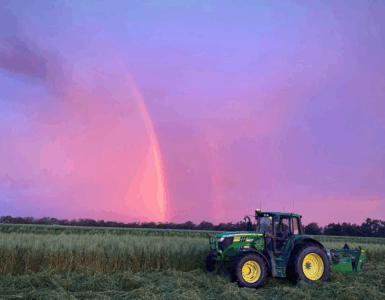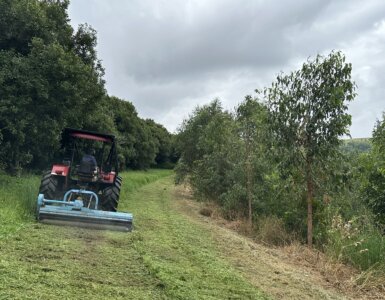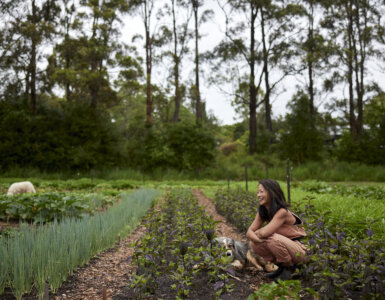If cricket is the sound of summer in Australia, then surely the taste is a sweet handful of cherries.
For so many Australians, childhood memories of summer and the Christmas season involve a bowl full of cherries at the ready.
And Young-based cherry and plum producer, Scott Coupland, loves hearing those stories.

Scott – a fourth generation grower – and his partner Daisy sell fruit under their own Australian Blue Bird brand and have recently started selling cherries and plums from their property in the south west slopes region of NSW direct to consumers in Sydney.
Scott says the best part is hearing the memories conjured from the taste of the food he produces.
“Cherries are a very seasonal fruit and in Australia, Christmas and cherries go hand in hand,” Scott said.
Once upon a time they were the first summer fruit to hit the market after winter, and over the generations Australians have become very sentimental about cherries.
Scott and his family before him have worked hard to grow the perfectly tasting cherry.
While Scott gives much of the credit to ‘Mother Nature’, it’s clear the Couplands have needed to strike the right balance between their land and soil type, the seasons and the climate, and the varieties of fruit they grow.
With traditional markets looking jittery a few years ago, Scott and Daisy reworked their marketing strategy for their cherries and plums and moved to more face-to-face sales with customers who they found were becoming increasingly conscious about where their food came from and how it was produced.

That strategy really came into its own when the COVID-19 lockdown restrictions hit, with more and more consumers eager to buy quality Australian produce direct from the farmer.
“We’d been selling at markets for a couple of years but once Australia went into lockdown, we took off,” Scott said.
There was a real desire during that time to go direct to the farmer, to support small business and to buy Australian.
“For us, we were more affected by COVID in January when our export markets were thrown into chaos – in March and April we were busier than ever.”
Scott said their established base of repeat buyers from the markets started contacting him about having food delivered during lockdown, and he and Daisy started making produce boxes with a range of local food from neighbours and friends from his region and delivering them to Sydney each week.
“We love dealing directly with the people eating our food. People remember us, and they come back to see us week after week because they want food which is going to eat well.”

So successful has the move to direct sales been that Scott is replacing some of the cherry trees he lost during the drought with apples, pears and peaches to offer a broader range of fruit to his customers all year round.
While COVID has caused headaches for many farmers who rely on backpacker staff to pick fruit, Scott’s harvest has been largely unaffected because he has focused on securing a locally-based workforce which he can call on year after year.
He said a lot of training was involved when employing backpackers and he wanted an employee base for harvest which he could turn to more than just once.
But he acknowledged workforce and labour issues as one of the biggest issues facing his industry at the moment, which will only get worse if there is no government strategy to manage it soon, he added.
Yet despite those challenges, Scott says the appetite for food and holidays in regional Australia has never been greater.
“We were in drought for three years before we got any assistance, but COVID has been a godsend for farmers and rural small businesses, because everyone is holidaying here and wants to buy our food and stay in our regions. Rural towns are booming because of it.”








































Add comment